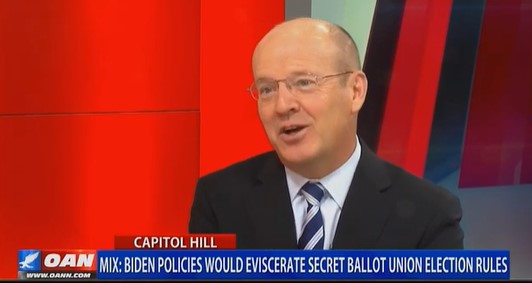Is This Any Way to Run a City’s Schools?
Leaked CTU Proposals Won’t Do Anything to Improve Schools’ Poor Performance

Since the pro-union monopoly National Labor Relations Act (NLRA) was rubberstamped by Congress in 1935 and upheld by a politically intimidated U.S. Supreme Court two years later, it has furnished Big Labor with many legal privileges, but few checks on its power.
One of the key checks — workers’ statutory right to vote out a union they don’t want — was added in 1947.
Unfortunately, for decades, bureaucratic rules made it easy for Big Labor lawyers to block workers from exercising their right under the NLRA to vote out a union they don’t want.
All union lawyers had to do was file “unfair labor practice” charges against the employer. It didn’t matter if the charges were meritorious or not, or if they had any potential impact on employees’ desire for union “decertification.”
But three years ago, after receiving ample input from National Right to Work Legal Defense Foundation attorneys, Trump appointees on the National Labor Relations Board (NLRB) finally reformed the agency’s “blocking charge” rule, making it much less difficult for workers to vote out an unwanted union.
“Thanks to the Trump NLRB’s Election Protection Rule, elections are proceeding more quickly and the results are being announced sooner,” noted National Right to Work Foundation and Committee President Mark Mix. “And in the last two years the NLRB has seen a large increase in petitions being filed to remove unwanted unions.”
In many workplaces located in places like Atchison, Kan., Selbyville, Del., and Carpentersville, Ind., employees have benefited from Foundation attorneys’ advice and counsel while throwing union bosses out of workplaces.
Of course, the 2020 reform didn’t make it easy for workers to get rid of a counterproductive union — just significantly less difficult.
One of the most appalling recent illustrations of the obstacles that remain for freedom-loving workers unfolded in Venango County, Pa. Workers at the Latrobe Specialty Metals Company disapproved of a proposed agreement between their employer and United Steel Workers (USW) union bosses.
To block the deal, the workers filed for decertification.
When USW autocrats got wind of this decertification effort, they attempted to quash it by quietly okaying the unacceptable contract, despite employees’ having already voted it down.
Ratification would have put into effect the so-called “contract bar,” which prevents any decertification vote for up to three years after an agreement is forged.
This assault on employees’ rights might well have succeeded, except the secretly ratified contract did not state the date it was to go into effect. Apparently because of USW bosses’ oversight, the contract was found to be invalid, and Latrobe Specialty Steel employees were able to oust the union in January.
Of course, the recent rise in the speed and efficiency of decertifications displeases union bosses and their allies in Congress and the Biden Administration.
That’s why they have devised a plan to overturn the Trump NLRB’s 2020 election reform.
Sen. Ted Kennedy protégé Lauren McFerran, elevated to the NLRB chairmanship by Joe Biden, and two Biden appointees to the board, along with Trump appointee Marvin Kaplan, are now reviewing a proposal by Biden-appointed NLRB General Counsel Jennifer Abruzzo to reinstate the pre-2020 “blocking charge” regime.
This proposal, and several others clearly designed to make it extremely difficult for workers to decertify a union, are utterly meritless on policy grounds. It is impossible to view them as anything other than a political payback by the Biden Administration.
Fortunately, due to the Committee’s successful efforts during last year’s midterm elections to raise citizen awareness regarding the Right to Work issue, this year avowed Right to Work supporters in the U.S. House are now in a position to furnish genuine oversight of the Biden Administration’s myriad labor policy abuses.
“The new majority on the House Education and Workforce Committee should promptly call in General Counsel Abruzzo and Chairman McFerran to explain publicly their decision-making.
And budgetary provisions to prevent the NLRB from spending taxpayers’ money to deny workers the ability to throw out a union must be on the table,” said Mr. Mix.
“Meanwhile, throughout this Congress, National Right to Work will assuredly be putting a spotlight on Biden bureaucrats’ schemes to deprive workers of even the limited protections from Big Labor that the NLRA is supposed to afford them.”
This article was originally published in our monthly newsletter. Go here to access previous newsletter posts.
To support our cause and help end forced unionism, go here to donate.

Leaked CTU Proposals Won’t Do Anything to Improve Schools’ Poor Performance

Wherever Big Labor wields the power to collect forced union dues, union bosses funnel a large share of the confiscated money into efforts to elect and reelect business-bashing politicians. Employment growth tends to lag as a consequence.

Members Insist They Keep Pro-Right to Work Campaign Promises